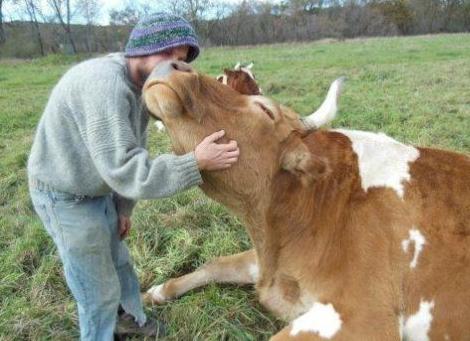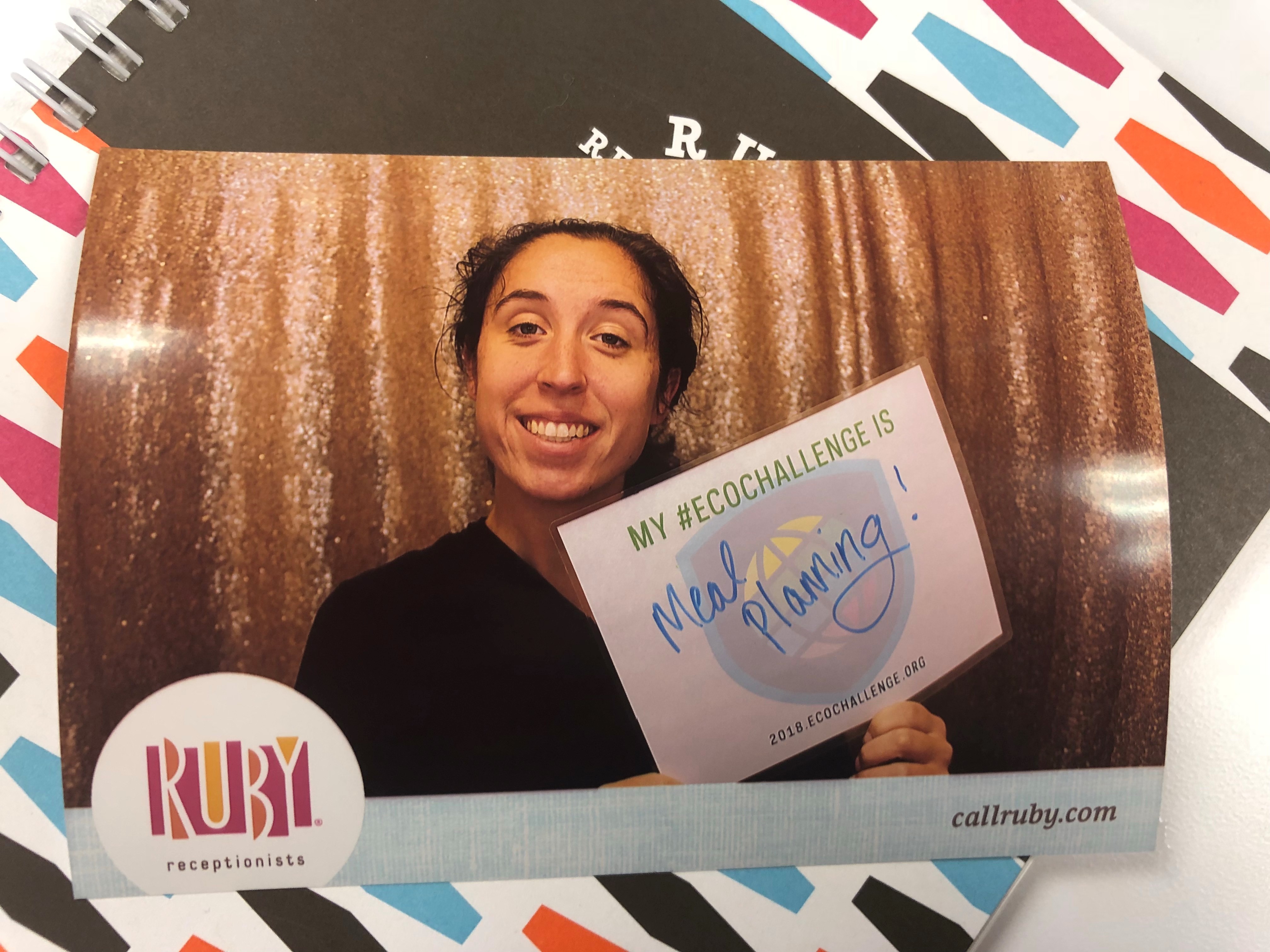Katherine Carr
"Small changes to my habits can make a big impact. "
POINTS TOTAL
- 0 TODAY
- 0 THIS WEEK
- 462 TOTAL
participant impact
-
UP TO1.0documentarywatched
-
UP TO90minutesspent learning
-
UP TO19plastic bottlesnot sent to the landfill
Katherine's actions
Waste
Use Reusable Bags
I will not accept any disposable bags when making purchases.
Food
Watch a Documentary about Food Sovereignty
I will watch 1 documentary(ies) about food sovereignty: the right of local peoples to control their own food systems including markets, ecological resources, food cultures and production methods.
Waste
Use a Reusable Water Bottle
I will keep 1 disposable plastic bottle(s) from entering the waste stream by using a reusable water bottle.
Food
Meet My Local Farmers
I will visit my nearest farm to find out who produces my food, and will learn about the quality of life of those who produce my food in other regions of the world to make better choices when I shop.
Food
Weekly Meal Planning
I will reduce food waste and save money by planning a weekly menu, only buying the ingredients I need.
Participant Feed
Reflection, encouragement, and relationship building are all important aspects of getting a new habit to stick.
Share thoughts, encourage others, and reinforce positive new habits on the Feed.
To get started, share “your why.” Why did you join the challenge and choose the actions you did?
-
 Katherine Carr 10/23/2018 2:36 PMWhile I haven't met any of my local farmers yet, I did get to connect with a woman who raises cattle locally. Folks can purchase a share of an animal and receive meat and bones when they slaughter. They also let you come visit and meet the animals, which I think will be an important piece of showing our daughter the full food system and letting her make an informed decision about whether or not she chooses to eat meat and, if so, where she sources it.
Katherine Carr 10/23/2018 2:36 PMWhile I haven't met any of my local farmers yet, I did get to connect with a woman who raises cattle locally. Folks can purchase a share of an animal and receive meat and bones when they slaughter. They also let you come visit and meet the animals, which I think will be an important piece of showing our daughter the full food system and letting her make an informed decision about whether or not she chooses to eat meat and, if so, where she sources it.-
 Marianne Greco 10/23/2018 2:59 PMMEET YOUR MEAT !
Marianne Greco 10/23/2018 2:59 PMMEET YOUR MEAT !
This challenge has really exposed the blindness of my actions as they relate to my espoused values. If I were to meet the animal, I would probably not be able to eat it! Not everyone feels this way, but when facing the reality of my food choice, it seems that avoiding the animal in order to be comfortable continuing to eat meat is intellectually dishonest for me. I take this challenge to heart and commit to do some or all of the following:- reduce meat consumption to about 8 ounces per week.
- buy only from local farms that humanely raised and naturally pasture their animals.
- advocate for humane treatment of farm animals
- If I were to "meet the meat," as Katherine suggests, my relationship with meat animals would become honest and intrinsic, rather than conflicted and hypocritical. This is a tricky one - it might make me a vegetarian!
-
-
REFLECTION QUESTIONFood Meet My Local FarmersWhen you know who produces your food, you are connecting personally to your complex regional food system. What are the advantages of knowing who produces your food and where it comes from? Do you think this might enable someone to advocate for a better quality of life for those who produce their food, both near and far?
 Katherine Carr 10/23/2018 2:34 PMKnowing who produces your food gives you a personal connection and a sense of personal responsibility. It also creates a sense of gratitude and respect for the hard work and energy that goes into our food production, and allows us to have a better perspective when we're thinking about policies and community decisions that affect our food systems and our farmers.
Katherine Carr 10/23/2018 2:34 PMKnowing who produces your food gives you a personal connection and a sense of personal responsibility. It also creates a sense of gratitude and respect for the hard work and energy that goes into our food production, and allows us to have a better perspective when we're thinking about policies and community decisions that affect our food systems and our farmers. -
REFLECTION QUESTIONFood Watch a Documentary about Food SovereigntyHow does food sovereignty address the complex agrarian transition to modern food systems?
 Katherine Carr 10/22/2018 2:53 PMThe documentary I watched was very informative, and I still think I have more to learn to have a firm grasp on food sovereignty. From my understanding, it puts the responsibility and power back in the hands of the people to return to traditional, natural, home-grown/home-gathered food systems that nurture mind, body, and spirit. The particular tribe the documentary focused on spoke about teaching others their traditional ways of growing, cooking, fishing, gathering, and hunting. They also spoke about preserving seeds, returning to the types of foods that have spirit and that nourish the body, and preserving the spiritual practices associated with celebrating their food resources.
Katherine Carr 10/22/2018 2:53 PMThe documentary I watched was very informative, and I still think I have more to learn to have a firm grasp on food sovereignty. From my understanding, it puts the responsibility and power back in the hands of the people to return to traditional, natural, home-grown/home-gathered food systems that nurture mind, body, and spirit. The particular tribe the documentary focused on spoke about teaching others their traditional ways of growing, cooking, fishing, gathering, and hunting. They also spoke about preserving seeds, returning to the types of foods that have spirit and that nourish the body, and preserving the spiritual practices associated with celebrating their food resources. -
 Katherine Carr 10/18/2018 4:56 PMI was reading this article today about food sovereignty (thank you ecochallenge), and loved the quote by MLK on the sideline "The arc of the moral universe is long, but it bends toward justice." http://usfoodsovereigntyalliance.org/what-is-food-sovereignty/
Katherine Carr 10/18/2018 4:56 PMI was reading this article today about food sovereignty (thank you ecochallenge), and loved the quote by MLK on the sideline "The arc of the moral universe is long, but it bends toward justice." http://usfoodsovereigntyalliance.org/what-is-food-sovereignty/ -
 Katherine Carr 10/17/2018 5:53 PM
Katherine Carr 10/17/2018 5:53 PM -
 Katherine Carr 10/17/2018 4:17 PMThe EcoChallenge always draws attention to the gaps in my current habits. While meal planning and buying local food from our grocery store, we're noticing that some of that food has a fair amount of plastic packaging. That's especially true of our salad greens. Time to find a farmer's market!
Katherine Carr 10/17/2018 4:17 PMThe EcoChallenge always draws attention to the gaps in my current habits. While meal planning and buying local food from our grocery store, we're noticing that some of that food has a fair amount of plastic packaging. That's especially true of our salad greens. Time to find a farmer's market! -
REFLECTION QUESTIONFood Weekly Meal PlanningAn average American throws out about 240 lbs of food per year. The average family of four spends $1,500 a year on food that they throw out. Does this surprise you? Where would you rather use this money?
 Katherine Carr 10/15/2018 11:32 AMThis doesn't surprise me. It's a great reminder that what we spend on waste we could instead spend on quality and sourcing locally. And donating to providing fresh, local food to those living with food uncertainty.
Katherine Carr 10/15/2018 11:32 AMThis doesn't surprise me. It's a great reminder that what we spend on waste we could instead spend on quality and sourcing locally. And donating to providing fresh, local food to those living with food uncertainty. -
REFLECTION QUESTIONWaste Use a Reusable Water BottleWhile water bottles serve an important role in places for health and safety, we can do more to reduce the unnecessary use of them. Can you identify the barriers in making this a new habit? How can you set yourself up for success in making this a permanent change?
 Katherine Carr 10/15/2018 11:31 AMHaving a water bottle on hand that is easy to clean makes a big difference. Also having easy access to water I trust at work is helpful. The biggest reason I buy water is because I forget to bring enough for making my daughter's bottle (she's a toddler) while we're out and about. I've started bringing a second water bottle just for her to make sure we're always carrying enough, and filling up anytime we find a water station or are at a restaurant while we're out and about. My office is downtown and my partner's office is on the waterfront, so we also have two go-to places we can stop and refill when we're out and about in the city.
Katherine Carr 10/15/2018 11:31 AMHaving a water bottle on hand that is easy to clean makes a big difference. Also having easy access to water I trust at work is helpful. The biggest reason I buy water is because I forget to bring enough for making my daughter's bottle (she's a toddler) while we're out and about. I've started bringing a second water bottle just for her to make sure we're always carrying enough, and filling up anytime we find a water station or are at a restaurant while we're out and about. My office is downtown and my partner's office is on the waterfront, so we also have two go-to places we can stop and refill when we're out and about in the city. -
REFLECTION QUESTIONWaste Use Reusable BagsWhat do you do if you find yourself in the situation of needing a bag for items but don't have a reuseable one with you? Carry things out in your hands? In a cart? Accept a disposable one? If you find yourself in this position often, what system could you put in place to try to establish this a successful habit?
 Katherine Carr 10/15/2018 11:26 AMI typically buy less and carry it out in my hands. Alternatively, I'll purchase a reusable bag. I have a bag that folds up extra-small that needs to be a permanent addition to my backpack to make sure I'm covered when I forget to bring my bags.
Katherine Carr 10/15/2018 11:26 AMI typically buy less and carry it out in my hands. Alternatively, I'll purchase a reusable bag. I have a bag that folds up extra-small that needs to be a permanent addition to my backpack to make sure I'm covered when I forget to bring my bags. -
 Katherine Carr 10/09/2018 12:35 PMMeal planning has been really impactful! We're still learning, but we've managed to make breakfasts and dinners at home successfully and to plan so far, with fresh and local ingredients. Tackling lunches has been a lot harder. If you have tips and tricks that get your food prep done in advance, I'd love to hear them!
Katherine Carr 10/09/2018 12:35 PMMeal planning has been really impactful! We're still learning, but we've managed to make breakfasts and dinners at home successfully and to plan so far, with fresh and local ingredients. Tackling lunches has been a lot harder. If you have tips and tricks that get your food prep done in advance, I'd love to hear them!

